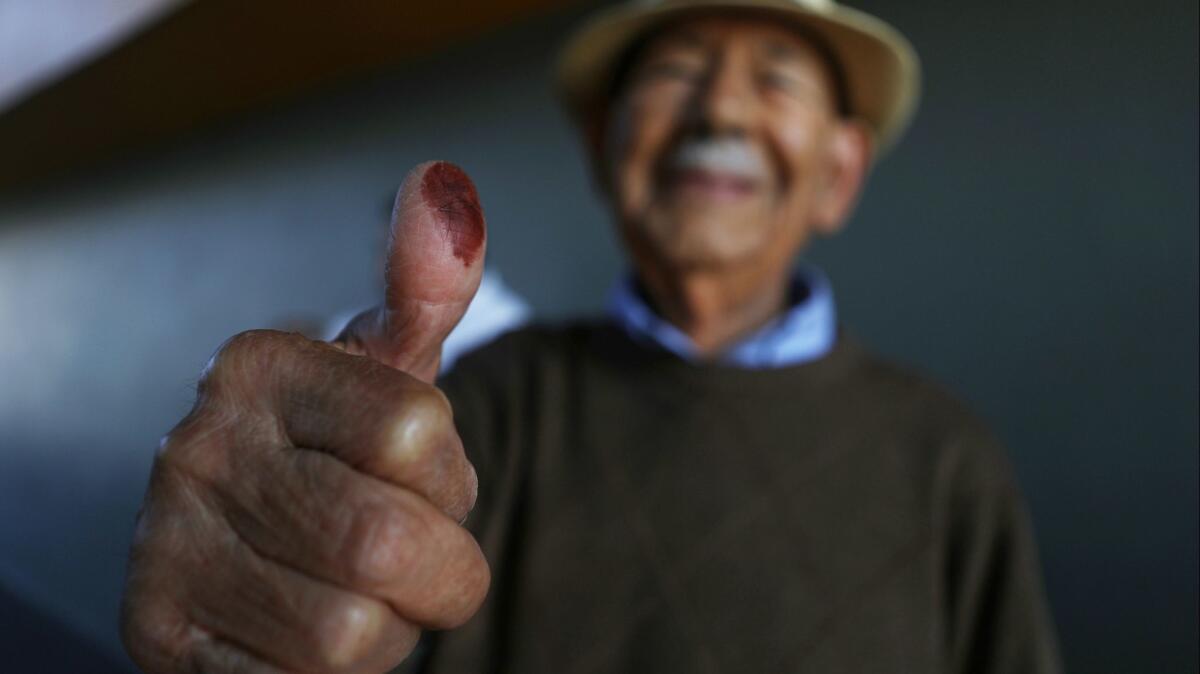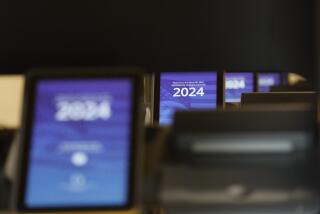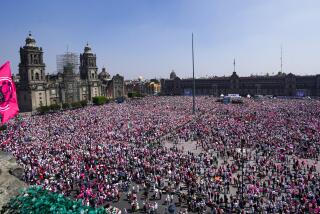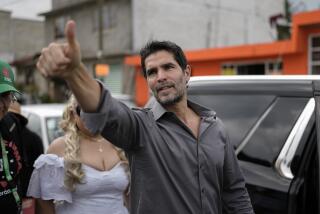By the hundreds, they crossed the border for the ‘privilege of voting’ in Mexico

A schoolteacher from North County, a factory worker from Riverside and an engineer from Bonita were among hundreds waiting for up to three hours at Tijuana’s A.L. Rodriguez International Airport on Sunday morning to vote in Mexico’s presidential election.
“The hope is that we can see a change,” said Patricia Van Sickel, 60, of Rancho Peñasquitos in northeastern San Diego. Registered to vote in Mexico City, she was preparing to cast a ballot for Ricardo Anaya of Mexico’s National Action Party, or PAN.
Unable to make it back to the Mexican capital in time, the English as a Second Language teacher instead joined the long line that snaked for much of the day through the airport’s lobby, spilling onto the sidewalk outside.
Waiting to vote were mothers pushing strollers, airline passengers pulling luggage, groups of friends on vacation and a dozen nuns wearing full habit.
Literally feet from the border, the airport also proved convenient for many Mexicans living in Southern California — both dual U.S. and Mexican citizens or U.S. legal residents.
As in other Mexican presidential elections, the National Electoral Institute set up special polling stations across the country for “voters in transit” — often at bus stations, airports, even hospitals.
Early Sunday, half a dozen Tijuana special stations were mobbed with such voters.
Among them was Maria Candida Ramirez Serrano, who was preparing to cast her ballot at the Tijuana airport after a three-hour wait that followed her two-hour drive from Riverside County.
“It’s worth it,” said Ramirez, 59, a U.S. resident who drove from Corona with her brother.
Ramirez moved to the United States from Puebla four years ago, after she couldn’t find work as a topographical engineer, and now works in a warehouse.
“At last, we’re going to see justice done, we’ll have opportunities for everyone,” said Ramirez, who was preparing to cast a ballot for Andres Manuel Lopez Obrador, the populist left-of-center front-runner who has a commanding lead in most polls.
Farther down the line, Marco Peña, a 26-year-old electrical engineer who is a dual citizen, said he had no faith in Lopez Obrador and planned to vote for Anaya, the PAN candidate.
Anaya “is the least bad” choice, said Peña, a Bonita resident originally from Guadalajara who worries about a Venezuelan-style government in Mexico if Lopez Obrador wins.
Though 6 p.m. was the scheduled closing time for polls across the city, workers at a special station at the Tijuana Cultural Center were forced to close the line after they ran out of ballots in the early afternoon, turning away about 30 people.
A crowd also converged early Sunday at a special station set up near downtown, at the foot of the replica of Tijuana’s historic Agua Caliente Tower. Among those waiting patiently was Ramon Cerrato, a 43-year-old construction worker from Santa Ana.
Though he has lived in the United States for 27 years, he has maintained close ties to his native Zacapu, Michoacan, where his mother still lives. He was planning to vote for Lopez Obrador, he said, “because I trust him more than the others.”
Since 2006, Mexicans living abroad have had the option of voting by mail in their country’s presidential elections. This year’s election for the first time allowed them to register without returning to Mexico, and more than 180,000 had done so by May, according to the electoral institute.
But several in the line said that they had not been able to fill out the proper forms before the deadline and that driving across the border was an easy option. And one woman said she registered but never received the ballot.
Antonio Moreno Padilla, casting his ballot at the Tijuana Cultural Center, was among a group of 200 people who drove from Los Angeles to vote in Tijuana, according to a report in the Tijuana newspaper Frontera.
“Many of us drive down for the simple reason that we want to give ourselves the privilege of voting in our Mexico,” said Moreno, a native of Michoacan.
Dibble writes for the San Diego Union Tribune.
More to Read
Start your day right
Sign up for Essential California for news, features and recommendations from the L.A. Times and beyond in your inbox six days a week.
You may occasionally receive promotional content from the Los Angeles Times.






